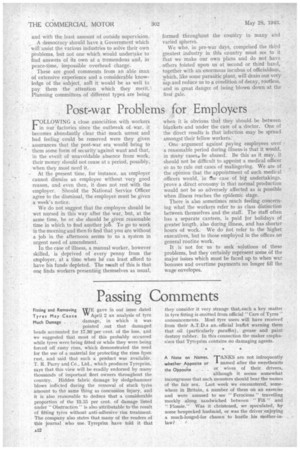Post-war Problems for Employers
Page 14

If you've noticed an error in this article please click here to report it so we can fix it.
COLLOWING a close association with workers in our • factories since the outbreak of war, it becomes abundantly clear that much unrest and bad feeling could be removed were they given • assurances that the post-war era. would bring to them some form of security against want and that, in the event of unavoidable absence from work, their money should not cease at a period, possibly, when they most need it.
At the present time, for instance, an employer • cannot dismiss an employee without very good • reason, and even then, it does not rest with the • employer. Should the National Service Officer agree to the dismissal, the employee must be given a week's notice.
We do not suggest that the employee should be wet nursed in this way after the war, but, at the same time, he or she should be given reasonable time in which to find another jo6. To go to work in the morning and then to find that you are without a job in the afternoon seems to us a system in urgent need of amendment.
In the case of illness, a manual worker, however skilled, is deprived of every penny, from the employer, at a time when he can least afford to have his funds depleted. The result of this is that one finds workers presenting themselves as usual, when it is obvious that they should be between blankets and under the care of a doctor. One of the direct results is that infection may be spread amongst their fellow workers: ' . One argument against paying employees oven' • a reasonable period during illness•is that it would, in many cases. Be abused. Be this as it may, it should not be difficult to appoint a medical officer So as to rule out cases of malingering. We are of the opinion that the appointment of such medical officers would, in The case of big, undertakings, prove a direct economy in that normal production would not be so adversely affected as is possible when illness reaches the epidemic stage.
There is also sometimes much feeling concerning what the workers refer to as class distinction between themselves and the staff. The staff often has a separate canteen, is paid for holidays of greater length, also during illness, and has shorter hours of work. We do not refer to the higher executives, but to those emploYed in the offices on general routine work.
It •.is' not for us to seek solutions of these problems, but they certainly represent some of the major issues which must be faced up to when war bonuses and overtime payments no longer fill the wage envelopes.




















































